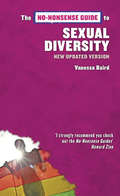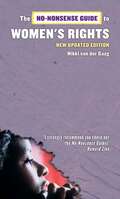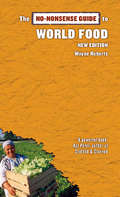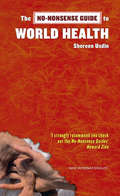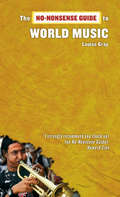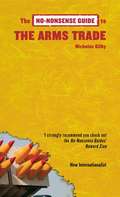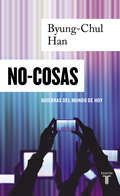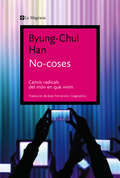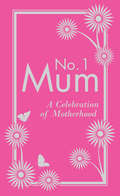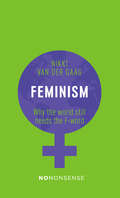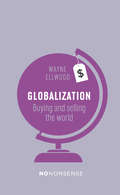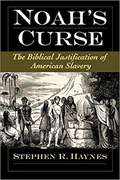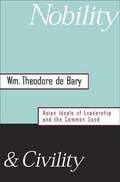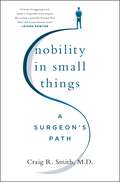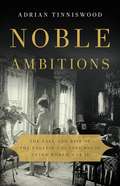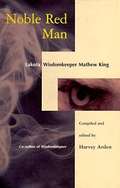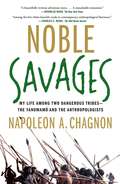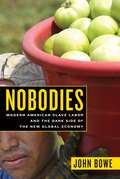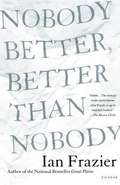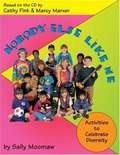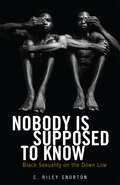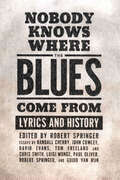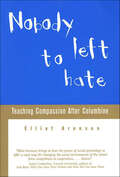- Table View
- List View
No-Nonsense Guide to Sexual Diversity, 2nd edition (No-Nonsense Guides #22)
by Vanessa BairdThe world is changing and especially so for lesbians, gays, and people who are bisexual and transgendered. In some countries, hard-won battles for equality are bearing fruit in non-discrimination legislation. In others, being gay incurs the death penalty. This No-Nonsense Guide gives an overview of sexual diversity and reveals the hidden histories of LGBTI individuals, cross-dressers, and eunuchs across the world. It traces the strange search for the scientific “source” of homosexuality, the history of homophobia, and the role that religion and politics have played in controlling sexualities. Also included is a country-by-country global survey of the laws that affect sexual minorities.
No-Nonsense Guide to Women’s Rights, 2nd edition (No-Nonsense Guides #27)
by Nikki van der GaagHas the battle for women'’s rights been won? As Niki van der Gaag points out, “it is easy to forget just how recently so many women’s rights have been won; and how many women still face violations of their rights on a daily basis.” In this No-Nonsense Guide, van der Gaag offers a status report on the women of the world by examining issues like health, poverty, politics, law, education, the environment, violence, and sexuality. And although we are not yet living in a “post-feminist” world and change is slow in coming, it is coming.
No-Nonsense Guide to World Food, 2nd Edition (No-Nonsense Guides #28)
by Wayne RobertsIn this updated edition of The No-Nonsense Guide to World Food Wayne Roberts puts under the microscope a global food system that is under strain from climate change and from economic disaster. He shows how a world food system based on supermarkets and agribusiness corporations is unsustainable and looks at new models of producing healthy food from all over the world.
No-Nonsense Guide to World Health (No-Nonsense Guides #29)
by Shereen UsdinHere is a clear, wide-ranging introduction to the worldwide state of human health. Starting with a brief history of modern medical progress, Shereen Usdin then untangles the knot created by poverty and globalization to show that where you live, how wealthy you are, and your gender all have a bearing on the diseases you may encounter in your lifetime—and your prospects for prevention, treatment, and ultimately, survival. Pulling no punches, Usdin also blows the whistle on the political economy of illness and how keeping people sick means more money for the pharmaceutical, tobacco, and food industries. This No-Nonsense Guide is a must-read for anyone who wants a clear sense of how healthy our global family really is.
No-Nonsense Guide to World Music (No-Nonsense Guides #31)
by Louise Gray“World music” is an awkward phrase. Used to describe the hugely multifaceted nature of a range of, typically, non-English language popular musics from the world over, it’s a tag that throws up as many problems as it does solutions. Louise Gray’s No-Nonsense Guide to World Music attempts to go behind the phrase to explore the reasons for the contemporary interest in world music: who listens to it and why? Through chapters that focus on specific areas of music, such as rembetika, fado, trance music and new folk, it explores the genres that have emerged from marginalized communities, music from conflict zones, and music as a form of escapism.
No-Nonsense Guide to the Arms Trade
by Nicholas GilbyOne of the few up-to-date works on the whole of the arms trade, this book puts the global trade in weapons in the context of history and includes recent controversial deals, as well as case studies on Saudi Arabia, Iraq, and Darfur. It exposes the cynicism, bribery, and insider deals that characterize the conventional trade and the hidden world of torture.Nicholas Gilby led the Campaign Against Arms Trade (CAAT) in its efforts to expose the corruption at the heart of Britain's arms deals with Saudi Arabia over the past four decades. In 2008, he forced the disclosure of many documents concerning corruption in Britain's arms deals with Saudi Arabia.
No-cosas: Quiebras del mundo de hoy
by Byung Chul HanEl nuevo libro del filósofo vivo más leído del mundo. «Hoy estamos en la transición de la era de las cosas a la era de las no-cosas. No son las cosas, sino la información, lo que determina el mundo en que vivimos.» Hoy en día, el mundo se vacía de cosas y se llena de información inquietante como voces sin cuerpo. La digitalización desmaterializa y descorporeíza el mundo. En lugar de guardar recuerdos, almacenamos inmensas cantidades de datos. Los medios digitales sustituyen así a la memoria, cuyo trabajo hacen sin violencia ni demasiado esfuerzo. La información falsea los acontecimientos. Se nutre del estímulo de la sorpresa. Pero este no dura mucho. Rápidamente sentimos la necesidad de nuevos estímulos, y nos acostumbramos a percibir la realidad como una fuente inagotable de estos. Como cazadores de información, nos volvemos ciegos ante las cosas silenciosas y discretas, incluso las habituales, las menudas y las comunes, que no nos estimulan, pero nos anclan en el ser. El nuevo ensayo de Byung-Chul Han gira en torno a las cosas y las no-cosas. Desarrolla tanto una filosofía del smartphone como una crítica a la inteligencia artificial desde una nueva perspectiva. Al mismo tiempo, recupera la magia de lo sólido y lo tangible y reflexiona sobre el silencio que se pierde en el ruido de la información.
No-coses
by Byung-Chul HanJa no habitem la terra i el cel, sinó Google Earth i el núvol.La informació domina el nostre entorn de vida, i les coses palpables passen cada cop més a un segon pla. El món com a esfera d'informació se superposa al món com a constel·lació de coses, i aquesta transició modifica substancialment la nostra percepció i relació amb el món. Byung-Chul Han analitza amb brillantor aquesta deriva, defensa la màgia de les coses i reflexiona sobre allò que es perd en el soroll de la informació. BYUNG-CHUL HAN (Seül, 1959)És un filòsof i assagista d'origen sud-coreà, professor de la Universitat de les Arts de Berlín. Escriu en alemany i és considerat com un dels filòsofs més destacats del pensament contemporani.
No. 1 Mum: A Celebration of Motherhood
by Alison MaloneyFor No. 1 Mums everywhere, this is the perfect celebration of motherhood, filled with inventive ideas and clever tips and bubbling with joyful things. From chicken soup to Sunday roasts, bubble bath to balloons, No. 1 Mum pays tribute to the top 100 objects every mother will recognise, in a fun and handy book that promises to amuse and inspire in equal measure. Along the way, Alison offers great ideas to complement the objects – top-ten ideas for travel games to play, a birthday cake recipe that will wow your child’s friends, the perfect solution to the thorny school play costume dilemma – in an entertaining and rewarding celebration of motherhood.
NoNonsense Feminism: Why the World Still Needs the F-word (No-Nonsense Guides #2)
by Nikki van der GaagWe were supposed to be in a ‘postfeminist’ age. But recently we’ve seen a resurgence of feminist campaigning among women (and some men). There’s a new brand of feminism: young, social media savvy, militant. But there’s also a new kind of backlash, driven by so-called fundamentalists and by increasingly overt misogyny. This book takes an international perspective on the new feminist movements.
NoNonsense Globalization
by Wayne EllwoodGlobalization has shrunk the world in the name of free trade and broken down many of the boundaries between peoples. But it has also been a powerful driver of inequality, over-consumption and corporate control. This fully updated edition unpacks the complexities of globalization, examines the forces in whose interests it works, and provides the critical analysis for re-appraising the system. Wayne Ellwood is former co-editor of New Internationalist magazine. He worked as an associate producer with the BBC television series, Global Report, and edited the reference book, The A to Z of World Development. He is author of the No-Nonsense Guide to Degrowth and Sustainability.
Noah's Curse: The Biblical Justification of American Slavery
by Stephen R. Haynes"A servant of servants shall he be unto his brethren." So reads Noah's curse on his son Ham, and all his descendants, in Genesis 9:25. Over centuries of interpretation, Ham came to be identified as the ancestor of black Africans, and Noah's curse to be seen as biblical justification for American slavery and segregation. Examining the history of the American interpretation of Noah's curse, this book begins with an overview of the prior history of the reception of this scripture and then turns to the distinctive and creative ways in which the curse was appropriated by American pro-slavery and pro-segregation interpreters.
Nobility & Civility: Asian Ideals of Leadership and the Common Good
by Wm. Theodore de BaryGlobalization has become an inescapable fact of contemporary life. Some leaders, in both the East and the West, believe that human rights are culture-bound and that liberal democracy is essentially Western, inapplicable to the non-Western world. How can civilized life be preserved and issues of human rights and civil society be addressed if the material forces dominating world affairs are allowed to run blindly, uncontrolled by any cross-cultural consensus on how human values can be given effective expression and direction? <p><p> In a thoughtful meditation ranging widely over several civilizations and historical eras, Wm. Theodore de Bary argues that the concepts of leadership and public morality in the major Asian traditions offer a valuable perspective on humanizing the globalization process. Turning to the classic ideals of the Buddhist, Hindu, Confucian, and Japanese traditions, he investigates the nature of true leadership and its relation to learning, virtue, and education in human governance; the role in society of the public intellectual; and the responsibilities of those in power in creating and maintaining civil society. <p> De Bary recognizes that throughout history ideals have always come up against messy human complications. Still, he finds in the exploration and affirmation of common values a worthy attempt to grapple with persistent human dilemmas across the globe.
Nobility in Small Things: A Surgeon's Path
by Craig R. Smith M.D.His routine was the same every day for 38 years: up at 4:15, make a turkey-on-rye, drive the deserted Henry Hudson Parkway to the hospital, check the schedule, scrub, cut, reattach, save a life or two, repeat. Until March 2020, when the Covid-19 pandemic shut hospital surgeries all over the world.Craig Smith, M.D., Chairman of the Department of Surgery at Columbia Presbyterian Hospital, went from performing heart surgeries on patients both everyday and celebrated (he performed the quadruple bypass that saved Bill Clinton’s life in 2004) to sitting in his tomb-quiet office looking out at George Washington Bridge. And he started to write. His Covid emails were balm to the staffers and later became celebrated for Dr. Smith’s care and thought in his assessment of the work of the hospital–of any hospital.Nobility in Small Things not only takes us into the mind and soul of a surgeon with the ability to “play God” but into the heart of a man who chose a lifesaving career. The book introduces us to patients and peers, and moves from family-building and heartbreak at home, to the tragic suicide of two fellow M.D.s. Dr. Smith also writes vulnerably about his debilitating social anxiety and how he overcame it.Dr. Smith shows us not just the making of a surgeon in Nobility in Small Things, but the maintenance of one: the deep feeling and moral philosophy that anchor the daily miracles that define his profession.
Noble Ambitions: The Fall and Rise of the English Country House After World War II
by Adrian TinniswoodA rollicking tour of the English country home after World War II, when swinging London collided with aristocratic valuesAs the sun set slowly on the British Empire, its mansions fell and rose. Ancient families were reduced to demolishing the parts of their stately homes they could no longer afford, dukes and duchesses desperately clung to their ancestral seats, and a new class of homeowners bought their way into country life. A delicious romp, Noble Ambitions pulls us into these crumbling halls of power, leading us through the juiciest bits of postwar aristocratic history—from Mick Jagger dancing at deb balls to the scandals of Princess Margaret. Capturing the spirit of the age, historian Adrian Tinniswood proves that the country house is not only an iconic symbol, but a lens through which to understand the shifting fortunes of the British elite in an era of monumental social change.
Noble Red Man: Lakota Wisdomkeeper Mathew King
by Harvey ArdenThis volume presents a complete compilation of the visions and insights of Matthew King, the grandson of both Crazy Horse and Sitting Bull. National Geographic senior writer Harvey Arden has distilled King's wisdom into a richtreasury, organizing it to read as if it were an intimate conversation with the Lakota chief.
Noble Savages: My Life Among Two Dangerous Tribes -- The Yanomamo and the Anthropologists
by Napoleon ChagnonONE OF THE MOST IMPORTANT SCIENTIFIC MEMOIRS OF OUR TIME When Napoleon Chagnon arrived in Venezuela's Amazon region in 1964 to study the Yanomamö Indians, one of the last large tribal groups still living in isolation, he expected to find Rousseau's "noble savages," so-called primitive people living contentedly in a pristine state of nature. Instead Chagnon discovered a remarkably violent society. Men who killed others had the most wives and offspring, their violence possibly giving them an evolutionary advantage. The prime reasons for violence, Chagnon found, were to avenge deaths and, if possible, abduct women. When Chagnon began publishing his observations, some cultural anthropologists who could not accept an evolutionary basis for human behavior refused to believe them. Chagnon became perhaps the most famous American anthropologist since Margaret Mead--and the most controversial. He was attacked in a scathing popular book, whose central allegation that he helped start a measles epidemic among the Yanomamö was quickly disproven, and the American Anthropological Association condemned him, only to rescind its condemnation after a vote by the membership. Throughout his career Chagnon insisted on an evidence-based scientific approach to anthropology, even as his professional association dithered over whether it really is a scientific organization. In Noble Savages, Chagnon describes his seminal fieldwork--during which he lived among the Yanomamö, was threatened by tyrannical headmen, and experienced an uncomfortably close encounter with a jaguar--taking readers inside Yanomamö villages to glimpse the kind of life our distant ancestors may have lived thousands of years ago. And he forcefully indicts his discipline of cultural anthropology, accusing it of having traded its scientific mission for political activism. This book, like Chagnon's research, raises fundamental questions about human nature itself.
Nobodies: Modern American Slave Labor and the Dark Side of the New Global Economy
by John BoweAward-winning journalist Bowe exposes the outsourcing, corporate chicanery, immigration fraud, and sleights of hand that allow forced labor to continue in the United States while the rest of the American public notice nothing but the everyday low price at the checkout counter.
Nobody Better, Better Than Nobody
by Ian FrazierIn this collection of five extended essays that appeared in The New Yorker from 1978 to 1986, Frazier raises journalism to high literary art. His vivid stories showcase a parade of American life, from portraits of Heloise, the syndicated household-hints columnist, and Jim Deren, the urban fly-fisher's guru, to small-town residents in western Kansas preparing to celebrate a historic, mutual massacre, to which they invite the Cheyenne Indians' descendants with the promise of free bowling.
Nobody Else Like Me
by Sally MoomawMake music time count! A musical celebration of the diversity of children, Nobody Else Like Me gives teachers and children a joyful way to begin talking (and singing) about the ways we are different. Based on 12 songs from the CD by Grammy-nominated musicians Cathy Fink and Marcy Marxer, the activities that accompany each song will help teachers deepen children's experiences with different cultures, languages, and abilities. Sally Moomaw is Professional Development Coordinator and Adjunct Instructor at the Arlitt Child and Family Research and Education Center at the University of Cincinnati. She is the co-author of the More Than . . . curriculum series published by Redleaf Press. She lives in Blue Ash, Ohio.
Nobody Ever Died of Old Age
by Sharon R. CurtinThe young author's observations of and encounters with elderly people reveal the tragedy and degradation of growing old in America today and stress the need for immediate reform.
Nobody Is Supposed to Know: Black Sexuality on the Down Low
by C. Riley SnortonSince the early 2000s, the phenomenon of the &“down low&”—black men who have sex with men as well as women and do not identify as gay, queer, or bisexual—has exploded in news media and popular culture, from the Oprah Winfrey Show to R & B singer R. Kelly&’s hip hopera Trapped in the Closet. Most down-low stories are morality tales in which black men are either predators who risk infecting their unsuspecting female partners with HIV or victims of a pathological black culture that repudiates openly gay identities. In both cases, down-low narratives depict black men as sexually dangerous, duplicitous, promiscuous, and contaminated.In Nobody Is Supposed to Know, C. Riley Snorton traces the emergence and circulation of the down low in contemporary media and popular culture to show how these portrayals reinforce troubling perceptions of black sexuality. Reworking Eve Sedgwick&’s notion of the &“glass closet,&” Snorton advances a new theory of such representations in which black sexuality is marked by hypervisibility and confinement, spectacle and speculation. Through close readings of news, music, movies, television, and gossip blogs, Nobody Is Supposed to Know explores the contemporary genealogy, meaning, and functions of the down low.Snorton examines how the down low links blackness and queerness in the popular imagination and how the down low is just one example of how media and popular culture surveil and police black sexuality. Looking at figures such as Ma Rainey, Bishop Eddie L. Long, J. L. King, and Will Smith, he ultimately contends that down-low narratives reveal the limits of current understandings of black sexuality.
Nobody Knows Where the Blues Come From: Lyrics and History (American Made Music Series)
by Robert SpringerMusicians and music scholars rightly focus on the sounds of the blues and the colorful life stories of blues performers. Equally important and, until now, inadequately studied are the lyrics. The international contributors to Nobody Knows Where the Blues Come From explore this aspect of the blues and establish the significance of African American popular song as a neglected form of oral history.“High Water Everywhere: Blues and Gospel Commentary on the 1927 Mississippi River Flood,” by David Evans, is the definitive study of songs about one of the greatest natural disasters in the history of the United States. In “Death by Fire: African American Popular Music on the Natchez Rhythm Club Fire,” Luigi Monge analyzes a continuum of songs about exclusively African American tragedy. “Lookin’ for the Bully: An Enquiry into a Song and Its Story,” by Paul Oliver traces the origins and the many avatars of the Bully song. In “That Dry Creek Eaton Clan: A North Mississippi Murder Ballad of the 1930s,” Tom Freeland and Chris Smith study a ballad recorded in 1939 by a black convict at Parchman prison farm. “Coolidge’s Blues: African American Blues from the Roaring Twenties” is Guido van Rijn’s survey of blues of that decade. Robert Springer's “On the Electronic Trail of Blues Formulas” presents a number of conclusions about the spread of patterns in blues narratives. In “West Indies Blues: An Historical Overview 1920s-1950s,” John Cowley turns his attention to West Indian songs produced on the American mainland. Finally, in “Ethel Waters: ‘Long, Lean, Lanky Mama,’” Randall Cherry reappraises the early career of this blues and vaudeville singer
Nobody Left to Hate: Teaching Compassion After Columbine
by Elliot Aronson“Aronson brings to bear the power of social psychology to help us understand why a negative school environment can push vulnerable kids over the edge.” —James Garbarino, PhD, author of Lost BoysOn April 20, 1999, the halls of Columbine High School in Littleton, Colorado, reverberated with the sound of gunshots as two students, highly armed and consumed with rage, killed thirteen students and seriously injured twenty-three before turning the guns on themselves. It was the worst school massacre in our nation’s history. Can we prevent a tragedy like this from happening again?In Elliot Aronson’s Nobody Left to Hate, one of our nation’s leading social psychologists argues that the negative atmosphere in our schools—the exclusion, taunting, humiliation, and bullying—played a major role in triggering the pathological behavior of the shooters. At the very least, such an atmosphere makes schools an unpleasant experience for most normal students.But it doesn’t have to be. Nobody Left to Hate offers concise, practical, and easy-to-apply strategies for creating a more supportive, stimulating, and compassionate environment in our schools. Based on decades of scientific research and classroom testing, these strategies explain how students can be taught to control their own impulses, how to respect others, and how to resolve conflicts amicably. In addition, they show teachers how to structure classes to promote cooperation, rather than competition, without sacrificing academics. On the contrary, education is greatly enhanced.For parents, teachers, or anyone concerned with what is happening in our schools, Nobody Left to Hate provides a simple and effective plan of action that will make their children’s school not only a safe place, but a more humane place of learning.
